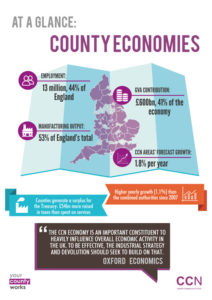
CCN Latest News, CCN News 2017 | 30 June 2017

Leaders of England’s largest councils have called on government to unleash the potential of the country’s economic ‘sleeping giants’ and devolve public spending and tax raising powers to rural areas.
A new report from world-leading economists Oxford Economics indicates the country’s growth is set to slow to under 2% each year over the next decade due to Brexit, but they argue devolving fiscal powers to England’s county authorities, who represent half of the nation’s population, could re-balance the economy, make a success of the Industrial Strategy, and help England cope better with any Brexit aftershocks.
Under Oxford Economics’ modelling, if county areas were given full devolution of public spending plus tax retention and raising powers, it could attract jobs and growth to rural areas, generating:
– Over 1million new jobs over the next ten years under CCN projections
– An extra £26.3bn generated for the national economy over a five-year period
– Public sector savings of £11.7bn per year over a five-year period
The report, Understanding County Economies, was commissioned by the County Councils Network, which represents every English shire county council and 10 county unitary authorities.
The study shows that county areas make up 41% of the English economy; delivering £600bn in GVA, and account for 44% of the nation’s employment, contributing significantly more than the country’s biggest cities. Collectively, they generate a net surplus for the Treasury.
This showcases their potential if a radical programme of fiscal devolution is granted for county areas, such as growth powers to create infrastructure and retaining a proportion of income tax, property tax, and council tax (with around half sent back to the Treasury).
This, coupled with subsequent tax raising abilities, could boost England’s annual growth to 2.7% a year (over five years) – significantly more than current forecasts, allowing the country to return to pre-Brexit growth forecasts: aiding its ability to successfully adapt to leaving the EU, help rebalance the economy, and will help address deeper disenfranchisement over the perceived remoteness of Westminster from rural residents.
The study also highlights county economies’ weaknesses: low productivity levels, a high concentration of ‘unskilled’ jobs, house prices 6% above the national average, areas with low concentrations of high growth sectors, and a high proportion of export industries which could be affected by Brexit.
CCN argues this report is crucial in the context of the government’s Industrial Strategy, which is welcomed by county leaders, but is too focused on the urban city regions. County leaders are urging the government to give county areas a great focus in the final strategy if it wants to achieve its aims, especially over raising the nation’s productivity levels.
With the Conservatives pledging to drop the requirement for metro-mayors for significant devolution deals in their manifesto, county leaders argue this government should now move to the next phase of devolution by offering up this radical programme to rural England.
When George Osborne heralded a ‘devolution revolution’ in 2015, the majority of county areas submitted bids to the government only two made it over the finish line: Cambridgeshire and Cornwall. Bids in Gloucestershire, Essex and Leicestershire were overlooked, while others fell apart at the final hurdle – because of the mayoral requirement – in Lincolnshire, Suffolk, Norfolk, and the North East.

Cllr Paul Carter, chairman of the County Councils Network, said:
“Successive governments have overlooked county areas in comparison to their metropolitan counterparts. The government’s Industrial Strategy and the country’s post Brexit fortunes depend on whether the potential of England’s sleeping economic giants – its county areas – is unleashed.
“With intelligent devolution deals and empowerment across county areas, so much more could be achieved to support economic growth and prosperity in England.
“We welcome the Government’s intention to remove its requirement for metro-mayors as part of devolution deals, which would greatly simplify negotiations for county areas. We stand ready and waiting to work with this administration to create tangible devolution to our rural areas, ensuring we truly have an economy that works for everyone, and more importantly, an economy that is resilient and able to successfully adjust to life outside the EU.”

Commenting on the results of the research, Oxford Economics’ Head of Global Cities Research, Richard Holt, said:
“Brexit means that to improve exports and manufacturing performance, the Industrial Strategy must look beyond the largest cities. Local economies covered by the County Council Network account for over half of England’s manufacturing output and almost 40% of exports.’
“That makes the CCN economy an important constituent of the whole — big enough not just to be influenced by, but to heavily influence overall economic activity in the UK.
“To be effective the Industrial Strategy and the next phase of devolution should seek to build on that.”
Notes to editor
– Founded in 1997, The County Councils Network represents 37 County Councils and Unitary authorities that serve county areas. CCN’s 37 member councils serve over 25 million people or 47% of the population, over 45 thousand square miles or 86% of England. CCN is a cross party organisation, expressing the views of county councils to the wider Local Government Association and to central government departments.
– Oxford Economics is one of the world’s foremost independent global advisory firms, providing reports, forecasts and analytical tools on 200 countries, 100 industrial sectors and over 3,000 cities. Their best-in–class global economic and industry models and analytical tools provide an unparalleled ability to forecast external market trends and assess their economic, social, and business impact.
– Oxford Economics forecast that on current trends, 565,000 jobs will be created in county areas up to 2027. In addition, full devolution to county areas could create 530,000 extra jobs over a five year period; with both figures totalling 1.09million jobs created by 2027.

Download our infographics that provide a summary of the report here.
© 2024 County Councils Network | Credits | Site map | Cookies | Privacy Policy.